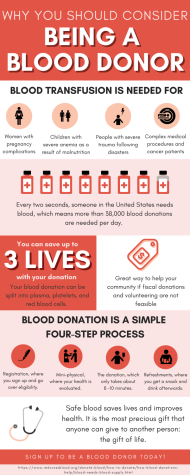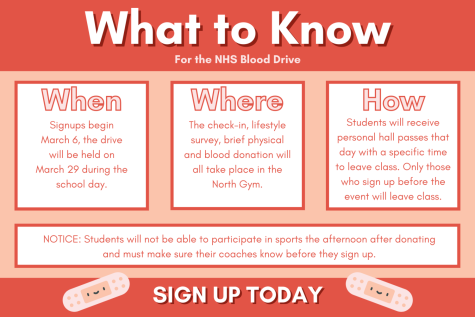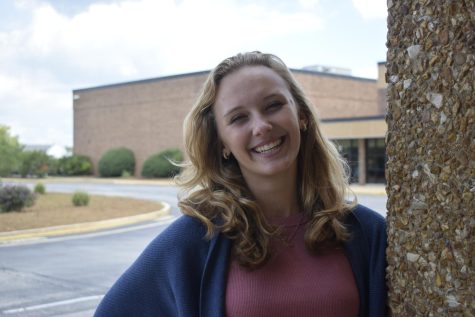People’s rationale for donating blood varies: they think it’s the right thing to do, as a means to get out of class, their parents made the suggestion or they have seen the direct impacts. ImpactLife Account Manager Mandy Dabbs helped NHS organize their blood drive, occurring March 29, and has heard many stories from donors.
“I worked with this man who donated all the time, so one day I asked him why he was always donating. He said his daughter had to receive blood when she was a little girl, and they didn’t have her blood type in the hospital,” Dabbs said. “He started yelling at the nurses to the point where the nurses were about to cry, and at that moment, somebody stood up from the waiting room and said, ‘When was the last time you donated blood?’ He stopped in his tracks. He never donated one unit of blood in his entire life.”
The blood drive will occur in the North Gym between 8 a.m. and 1 p.m. Students who signed up before the event will receive a hall pass with a designated time to leave class. When students arrive at the gym, four stations will be set up for the screening and donation process, which will take about 45 minutes.
NHS has tried to plan a blood drive in past years, but due to COVID-19, it hasn’t been able to happen. However, student President and senior Esha Francis has set goals for this blood drive and hopes NHS can continue the event each year after she graduates.

“The main goal we want to achieve with this blood drive is spreading awareness and bringing back our annual service project; we hope to do blood drives every year. Our goal for this blood drive is to raise awareness and try to reach 50 donations, but for the long run, the goal is to have this be an annual donation event in our community,” Francis said.
To donate, students must be 16 or older and have a parent consent form signed. Participants also need to weigh over 110 pounds. Student-athletes will not be able to participate in sports the day they donate, so they must get permission from their coaches in advance. NHS sponsor and English teacher Erin Fluchel donates regularly.
“I know for some people, it can seem scary. It’s not scary; it doesn’t hurt. [Blood] is something that I can give that is enormously helpful and costs me nothing. For students who maybe are short on time or money, it’s a way that we can make a big difference. [There have been] blood shortages, especially during COVID-19. The community need was and still is bigger than ever,” Fluchel said.
ImpactLife is targeting a younger demographic for blood donations. Currently, the age group that donates the most blood is the over-50 bracket, which according to the National Library of Medicine, could lead to a decline in donations as older donors age out of being able to donate blood.
“After people graduate high school, we see this huge decline [in donating] during their 20s. Right now, we’re trying to fill the gap, so how do we get people and students engaged not just [to] donate blood in high school, but continue to do it throughout their life?” Dabbs said. “It’s very important. There’s a huge gap. Eventually, the Baby Boomer generation [will not] be eligible to donate, and then what do we do? [So] students getting involved in donating is imperative.”
ImpactLife recommends that donors get eight or more hours of sleep the night before donating and eat a hearty dinner and breakfast the morning of. In addition, they urge donors to drink water and minimize caffeine intake to stabilize blood pressure. Starting March 6, NHS members will have a registration table at every lunch where students and faculty can sign up to donate.
“Do I want to have somebody stick a needle in me? No. Do I want there to be blood in the hospital if I need a transfusion if I’ve been in an accident or have suffered some sort of tragedy or traumatic event? Yes. It is a small inconvenience for me that can save someone’s life. Why not do it?” Fluchel said. “There are people who cannot donate for other reasons. If I’m a little bit afraid of a needle, I understand that, but [I] would want somebody to have done that difficult work of donating if [I] or a family member needs it. I think that can help [donors] get over [the fear of needles]. There are also other ways to contribute — by helping to work the blood drive, by donating time or money or other resources — but at the end of the day, blood is pretty easy to contribute.”
Donors and recipients alike have personal stories about how blood donations have impacted their lives for the better. If there are any other questions, see the common FAQs sheet or contact Fluchel at [email protected].


![NHS members wear red to support and promote blood donations. NHS sponsor and English teacher Erin Fluchel helped student members organize the event. “[Donating blood] is a really small thing that can make a big difference. It can impact people that you don't necessarily know. You don't see the immediate impact, but it can be really powerful,” Fluchel said.](https://pwestpathfinder.com/wp-content/uploads/2023/03/DSC_0004-900x600.jpg)


![Smiling in a sea of Longhorns, Fox 2 reporter Ty Hawkins joins junior Darren Young during the morning Oct. 3 pep rally. The last time West was featured in this segment was 2011. “[I hope people see this and think] if you come to [Parkway] West, you will have the time of your life because there are so many fun activities to do that make it feel like you belong here. I was surprised so many people attended, but it was a lot of fun,” Young said.](https://pwestpathfinder.com/wp-content/uploads/2025/10/Edited2-1200x798.jpg)
![West High seniors and families listen as a representative of The Scholarship Foundation of St. Louis, Teresa Steinkamp, leads a Free Application for Federal Student Aid (FAFSA) workshop. This session, held in the library, provided guidance on financial aid, scholarships and student loan options. “This event is very beneficial for any seniors who are applying to or considering applying to colleges after high school [because] the cost of college is on the rise for seniors and parents,” college and career counselor Chris Lorenz said.](https://pwestpathfinder.com/wp-content/uploads/2025/09/DSC_4478-1200x778.jpg)
![Senior Kamori Berry walks across the field during halftime at the Homecoming football game on Sept. 12. During the pep assembly earlier that day, she was pronounced Homecoming Queen. “I thought it was nice that the crowd [started] cheering right away. I know [my friends] were really excited for me, and my family was happy because typically non-white people don't win,” Berry said.](https://pwestpathfinder.com/wp-content/uploads/2025/09/DSC7046-Enhanced-NR-1200x798.jpg)



![Pitching the ball on Apr. 14, senior Henry Wild and his team play against Belleville East. Wild was named scholar athlete of the year by St. Louis Post-Dispatch after maintaining a high cumulative GPA and staying involved with athletics for all of high school. “It’s an amazing honor. I feel very blessed to have the opportunity to represent my school [and] what [it] stands for,” Wild said.](https://pwestpathfinder.com/wp-content/uploads/2025/05/unnamed-6-1200x714.jpg)
![The Glory of Missouri award recipients stand with their certificates after finding out which virtue they were chosen to represent. When discovering their virtues, some recipients were met with contented confirmation, while others, complete surprise. “I was not at all surprised to get Truth. I discussed that with some of the other people who were getting the awards as well, and that came up as something I might get. Being in journalism, [Fellowship of Christian Athletes and] Speech and Debate, there's a culture of really caring about truth as a principle that I've tried to contribute to as well. I was very glad; [Truth] was a great one to get,” senior Will Gonsior said.](https://pwestpathfinder.com/wp-content/uploads/2025/04/Group-Glory-of-Missouri.jpg)


Poonam Chaturvedi • Mar 13, 2023 at 9:50 pm
Wonderful step for humanity. Proud of you Esha.
Laurel • Mar 6, 2023 at 4:30 pm
I think Ashlyn covered the needs for blood donations very well. The idea of generating life long donors was well stated.
I hope you meet and surpass your goals!